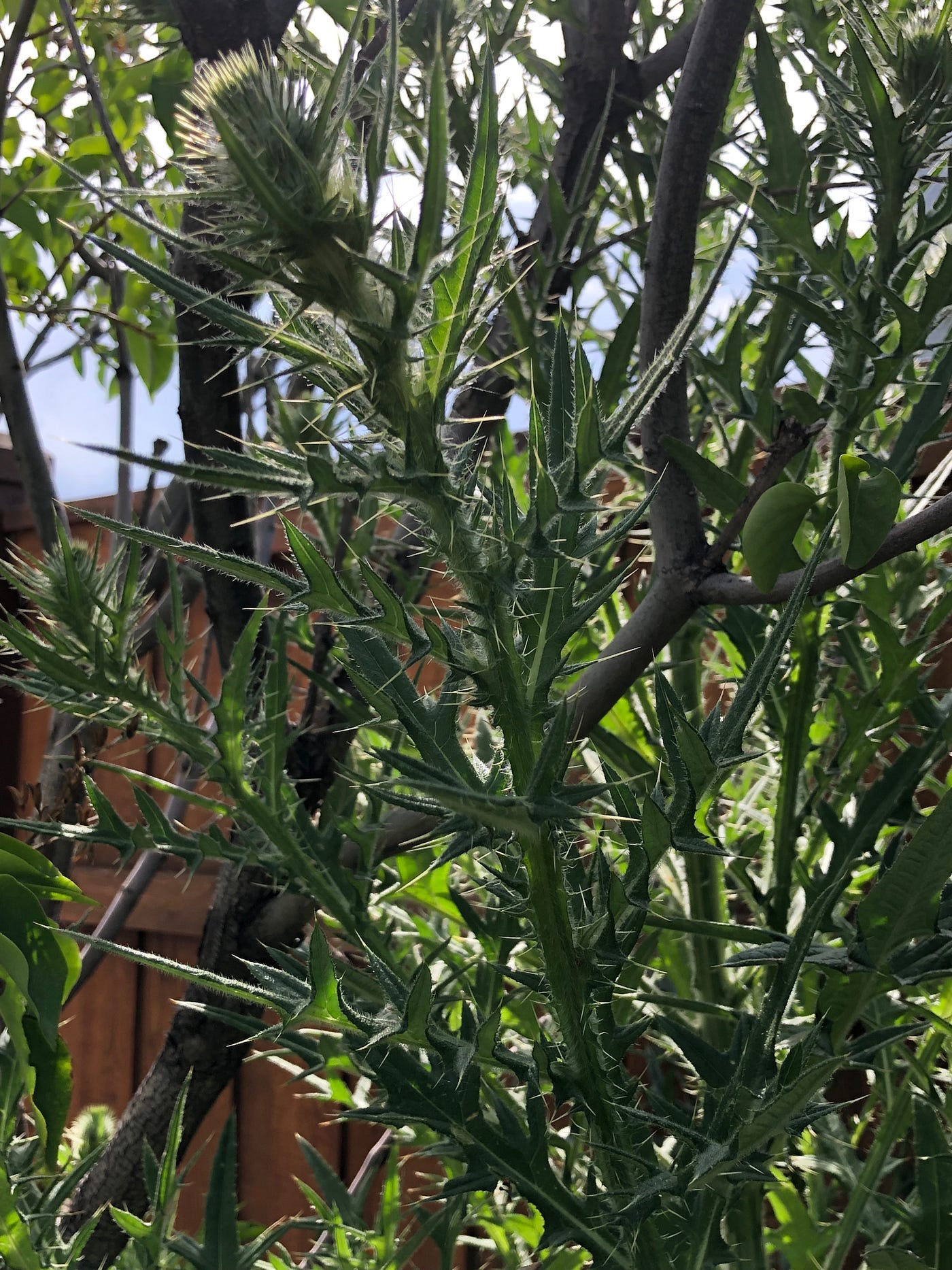I didn’t notice it at first.
I was mowing the lawn near the back fence of our yard when something out of place caught my eye. I stopped the mower and stepped up onto our small retaining wall to get a closer look. Wedged in the middle of our lilac bushes, probably my favorite part of the yard, was a six-foot thistle. Thick. Spiny. Ugly. And seemingly proud of itself for sprouting up to my eye level without me noticing.

That’s the culprit, right there.
The lilacs weren’t in bloom at the time, but I’ve always loved walking past them. We planted them years ago along the fence line that separates our yard from the neighbors’. Most of the time, they’re just a quiet reminder of the beauty I forget to appreciate until they burst alive in spring.
I tried to pull the thistle out, but the spines went straight through my gloves. Puncture-resistant, my foot — er, my hands. After a couple failed attempts, I gave up and grabbed a pair of branch clippers. It wasn’t elegant, but it was effective. As an extra measure, I dug out as much of the root as I could with a shovel.
For the next few weeks, I paid closer attention to the yard. I started noticing everything: edges that needed trimming, patches that were thinning, little invaders that didn’t belong.
Then, just like always, life sped up. I got busy. And more weeds grew while I looked the other way.
Until one morning, I stepped outside and found what looked like a full-on milkweed forest. No exaggeration. Dozens of them, tall, smug, and thriving. Apparently, the yard doesn’t wait for you to catch up.
(Yes, I often anthropomorphize the yard. It feels like a battle between me and nature, and nature never sleeps.)
That’s when it hit me… again. These things always feel like old lessons returning with new faces.
This is exactly how life works.
The weeds in my yard don’t grow overnight, even though it seems like it. They grow a little every day, while I’m distracted, tired, or overcommitted. They blend in at first. Then one day, they’re taller than me.
And it’s the same with everything else.
It’s the habits you stop tending. The relationships you assume will maintain themselves. The slow erosion of patience, joy, or rest that you don’t notice until it’s visibly missing and felt even more deeply.
Most of the time, I don’t neglect the yard because I’m lazy. I neglect it because I think I’ll get to it “soon.” I tell myself it doesn’t need attention yet. That it’s fine. That I’ve handled it before, and I’ll handle it again. Or, lately, that my wife will just take care of it.
The unfortunate truth: yards and lives don’t care much for good intentions. They respond to attention, and they grow what you let grow.
I’ve never loved yard work. Still don’t. Winter has always been my favorite season because I don’t have to do yard work. But mowing the lawn and pulling the weeds is what you sign up for when you buy a home. I celebrated the day my oldest son was finally strong enough to push the mower without my help. Each of our five kids has grown into yard work in their own way (which is mostly avoidance). And as their capability increased, I let my responsibility shrink.
At least that’s what I told myself.
But the thistle didn’t care how old my kids were. It grew because no one was watching. And removing it took more effort than I expected.
I grumbled plenty while digging it out. My hands stung from the spines poking through my gloves. But I walked away having actually learned something.
Maintenance matters more than rescue. It’s easier to pull a weed early than to dig out a root system that’s had time to dig itself in.
There’s something in that about connection, too. Real connection with the earth, with my home, and with the people I love takes effort. But usually quiet, consistent effort, not sweeping gestures or major overhauls.
And the yard, like life, keeps reminding me: you can’t outsource stewardship.
Lilacs don’t bloom just because I remember to appreciate them. They bloom when the conditions are right and only if they’re cared for. Not choked by weeds stealing their light.
It’s so easy to neglect what matters. Not because I don’t care, but because I’m distracted. There’s always something else demanding attention: work, screens, bills, fatigue.
But the cost of inattention is slow and cumulative.
If any of this resonates with you, I wrote a book you might appreciate.
It’s called You Don’t Have to Escape to Be Free — a collection of honest reflections about identity, meaning, and building a life you don’t want to run away from.
You can check it out here: https://books.by/aaronpace
You don’t see the weeds when they’re small. You just notice that the things you loved — quiet mornings, unhurried dinners, laughter from your kids, your own curiosity — start getting crowded out.
So you clip the thistle. You kneel in the grass. You get your hands dirty. Not to win. Not to finish. Just to begin again.
It’s not dramatic. It’s not efficient. It’s not even all that fun most of the time.
But it is necessary.
The yard, like everything else I’ve been trusted with, doesn’t need perfection. It just needs presence.
And that is enough.
No comments:
Post a Comment